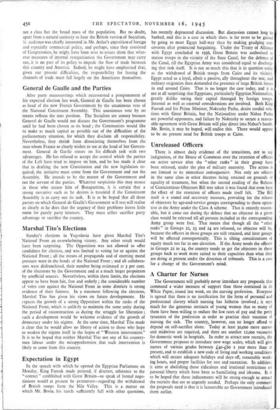General de Gaulle and the Parties
After party manoeuvrings which necessitated a postponement of his expected election last week, General de Gaulle has been chosen as head of the new French Government by the unanimous vote of the National Constituent Assembly. This unanimous vote by no means reflects the true position. The Socialists are uneasy because General de Gaulle would not discuss the Government's programme until he had been chosen as its head ; the Communists would like to make as much capital as possible out of the difficulties of the parliamentary situation, for which they disclaim all responsibility. Nevertheless, they shrink from dissociating themselves from the man whom France so clearly wishes to see at the head of her Govern- ment. General de Gaulle enters on his difficult task with two advantages. He has refused to accept the control which the parties of the Left have tried to impose on him, and he has made it clear that in drafting the new Constitution and the new legislation re- quired, the initiative must come from the Government and not the Assembly. He intends to be the master of the Government and not the servant of the parties. Whatever suspicions this may arouse in those who accuse him of Bonapartism, it is certain that a strong executive such as he desires is tssential if the Constituent Assembly is to carry out its task. It is to be hoped that all three parties on which General de Gaulle's Government will rest will realise as clearly as he does that the urgency of their problems leaves little room for purely party interests. They must either sacrifice party advantage or sacrifice the country.






























 Previous page
Previous page